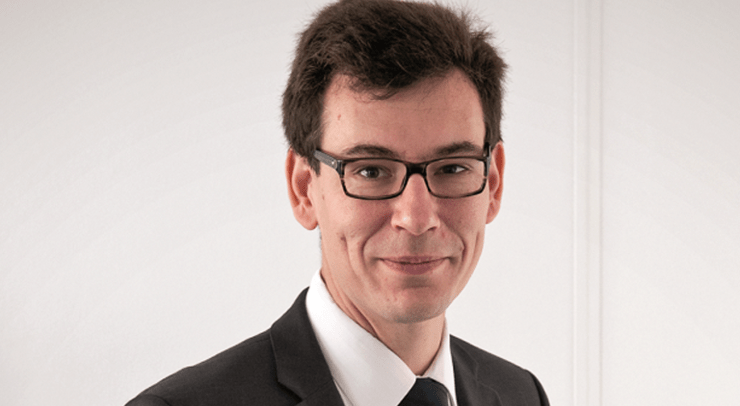Where intuition & risk-taking top the bill

Director General Delegate for Scientific Affairs at the CNRS, Philippe Baptiste prepared his doctorate, awarded in 1998, at UTC. “I wanted dearly to work with Jacques Carlier”, recalls Philippe who went on to enjoy a “passionate” academic career.
The first time he met Jacques Carlier, a research scientist and lecturer at the UTC-Heudiasyc Laboratory, he found him hunkered on the office floor, scrutinizing cardboard rectangles. “He was in fact investigating a concrete case of queuing theory, a topic lying between mathematics and computer science” adds Philippe with a smile. Armed with patience and determination, he had to wait a year before Jacques Carlier found the time to accept to supervise his thesis. “While waiting, I did a so-called Advanced HE Diploma (DEA) at the university Paris 6 (Pierre & Marie Curie) and that was where I really got to discover the joys of mathematics”.
A passion for discrete mathematics and algorithmics
It was his passion for mathematics that led Philippe Baptiste to start an academic career. He built up a really friendly relationship with Jacques Carlier, who left him lots of degrees of freedom during his PhD work. Here we have a research scientist for whom intuition and risk-taking take top priority, without neglecting the necessary scientific rigorous attention. I stayed on for a year at the UTC-Heudiasyc Laboratory with the professional status of ATER (research assistant) after which, with the support of Messrs Carlier, Charara and Dubuisson, my application to join the CNRS was accepted”. Between 2000–2001, Philippe Baptiste went over to the USA, to work at the IBM Research Center in New York. His work there revolved round basic research in the theory of complexity. Receiving a proposal to accept a professorial teaching position at the prestigious Ecole Polytechnique, Philippe Baptiste returned to France. “That’s the kind of proposal you just cannot turn down!” At the time, he was supervising or co-supervising (some with Jacques Carlier) several PhD theses. Two of these PhD students joined or stayed at the UTC-Heudiasyc Lab/: Antoine Jouglet (UTC lecturer) and David Savourey (research scientist and lecturer). Philippe then joined the joint CNRS/ Ecole Polytechnique Computer Science research teams at the LIX Lab over which he became director in 2008 and then set up the Computer Science Institute for the CNRS. For a short period, he held the position of Head of the Research and Innovation Strategy Service at the French ministry for HE and Research, after which he was appointed Director General Delegate for Scientific Affairs at the CNRS by President Alain Fuchs.
1 000 start-ups in the past 15 years at the CNRS
In his current position, Philippe Baptiste is responsible for the coordination of the CNRS’ 10 Institutes, for interdisciplinary projects, for innovation, international cooperation and partnership agreements and contracts. “The aim is to develop interdisciplinary projects, and this runs against the temptation to enjoy mono-disciplinary comforts. It is easier to work at the core of one’s own skills. However, an interdisciplinary approach becomes inevitable for certain scientific topics. We must have the means to take these practical and epistemological hurdles into our stride to encourage and induce more interdisciplinary exchanges and work”. Philippe also underscores the little known role of the CNRS to value-add to research and enhance innovation transfer operations. Thus, the CNRS is preparing to celebrate its 1 000th start-up, created in a partnership with other academic or economic actors. “The CNRS is far from being an ivory tower and its real added value is to see that breakthrough resrecah in the laboratories actually gets transferred to socio-economic applications”. Philippe Baptiste himself participated in the creation of several companies, including Ergelis, specialists in thermal building management using special optimization tools. Philippe would like to see the start-up operations multiply and grow and also to engage the CNRS is wider scope R&D programmes.
Structuring the French university scene
“I have an exciting and captivating job, since it lies at the crossroads of a multitude of scientific fields in close liaison with the laboratory heads and their highly-qualified research scientists. The CNRS also has an important role to play to help restructure the French university scene; at the present time, the latter is still somewhat ‘disorderly’. The CNRS, with its national vision, its superb equipment and its highly dynamic international policy, is a key actor in HER (higher education and research).” A vast majority of the 1 000 CNRS labs are joint research structures. “It is in our interest at the CNRS to have strong academic and university partners”. For students who wish to take up an academic career, Philippe Baptist’s advice is to love science and be prepared to take risks. “There can no such thing as a good thesis without taking high risks! France offers some very attractive openings for young high-flying research scientists.”
Bio-Notes:
- 1994 : engineering diploma from the Ecole nationale supérieure des Mines de Nancy
- 1998 : PhD in computer sciences and engineering, UTC Compiègne
- 1999 : recruited by the CNRS
- 2000 to 2001: IBM Research Center, New York
- 2002 to 2011: appointed adjunct professor at École Polytechnique
- 2008 : appointed Director joint CNRS/EP computer science Lab, the LIX
- 2010 : appointed Director of the Institute for Computer Sciences and Engineering and interactions at the CNRS
- 2013 : Head of the Research and Innovation Strategy Service at the French ministry for HE and Research June
- 2014 : appointed Director General Delegate for Scientific Affairs at the CNRS




